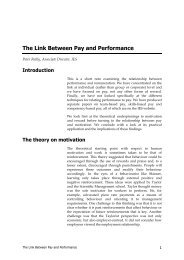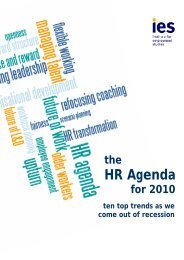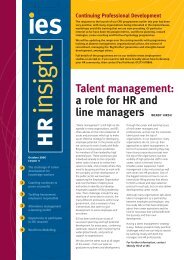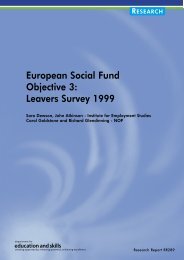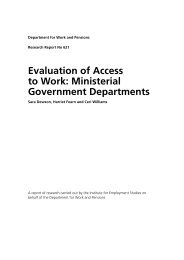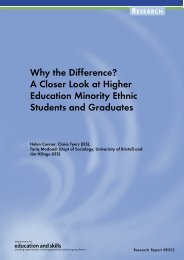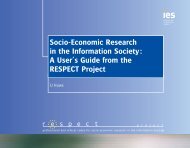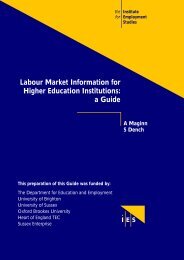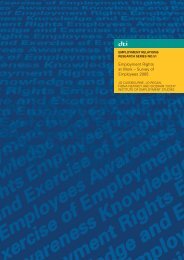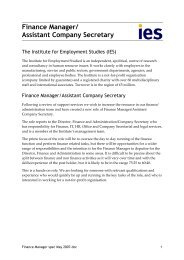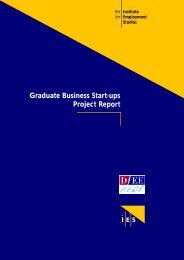Post-16 Transitions: a Longitudinal Study of Young People with ...
Post-16 Transitions: a Longitudinal Study of Young People with ...
Post-16 Transitions: a Longitudinal Study of Young People with ...
Create successful ePaper yourself
Turn your PDF publications into a flip-book with our unique Google optimized e-Paper software.
In cases such as these, transition at age <strong>16</strong> is largely meaningless,<br />
since there is only one option that meets the young person’s needs<br />
and wishes and that option is seen by all involved as the correct<br />
one. For these young people, the transition process is effectively<br />
deferred for two or three years and intensive planning for future<br />
options becomes part <strong>of</strong> their post-<strong>16</strong> programme.<br />
In other cases, transition is not deferred and appropriate levels <strong>of</strong><br />
preparation and support are <strong>of</strong>fered. However, there may be few<br />
real alternatives. Peter, for instance, is one <strong>of</strong> those young people<br />
whose difficulties were identified relatively late in his school career.<br />
Only towards the end <strong>of</strong> Year 8 <strong>of</strong> his comprehensive school did he<br />
receive a statement for Asperger’s Syndrome and for the first time<br />
began to receive support. The effect <strong>of</strong> the statement, however,<br />
was to trigger the formal processes <strong>of</strong> planning and review. Peter<br />
received input from Connexions - though from a mainstream rather<br />
than a SEN adviser on the grounds that the local service only had<br />
enough specialists to service special schools and units. Fortunately,<br />
his parents were proactive in planning for the future and keen that<br />
he should stay on in education. His school identified an appropriate<br />
option in the form <strong>of</strong> a two-year work preparation course at an FE<br />
College. In principle, there were other options available for Peter,<br />
but in practice, none <strong>of</strong> them was appropriate. Although he began<br />
to enjoy school more once he received support, the school sixth<br />
form at the time was narrowly academic. As the SENCO put it:<br />
“We are a very open sixth form now but I think two or three<br />
years ago we weren’t quite as open and you had to get five<br />
A-C grades before you could start A level …We as a sixth<br />
form are very low on vocational qualifications. We tend to be<br />
an academic sixth form so really we <strong>of</strong>fer academic subjects<br />
by and large and I think, I don’t think he got five A-C’s.”<br />
Work-based training was also an option in principle, but in practice<br />
Peter’s social and organisational difficulties made this impractical.<br />
All those involved are agreed that his current placement worked<br />
out well. However, it is not clear that there were any viable<br />
alternatives. In his mother’s words:<br />
“If there hadn’t been that course available, I really don’t<br />
know what would have been appropriate.”<br />
More generally, examples <strong>of</strong> relatively smooth transitions from the<br />
case studies seem to be the exception rather than the rule.<br />
Marcus, for instance, who has pr<strong>of</strong>ound and multiple learning<br />
difficulties, (PMLD) requires constant one-to-one assistance and is<br />
currently attending the sixth form unit <strong>of</strong> the special school which<br />
has provided all <strong>of</strong> his schooling. The unit is housed in a nearby<br />
Sixth Form College but is staffed by special school staff. In this<br />
way, it seeks to provide the best <strong>of</strong> both worlds in terms <strong>of</strong><br />
specialist provision on the one hand and opportunities for wider<br />
social interactions and experiences on the other. In this situation,<br />
there were probably no other realistic options for Marcus and<br />
transition planning in the sense <strong>of</strong> scoping out choices has not<br />
really been necessary. Despite this, however, the move to the sixth<br />
form unit did not go well because <strong>of</strong> the unfamiliarity <strong>of</strong> some staff<br />
<strong>with</strong> Marcus’s needs and difficulties in making appropriate<br />
<strong>Post</strong>-<strong>16</strong> <strong>Transitions</strong> <strong>of</strong> <strong>Young</strong> <strong>People</strong> <strong>with</strong> SEN: Wave 2 47



